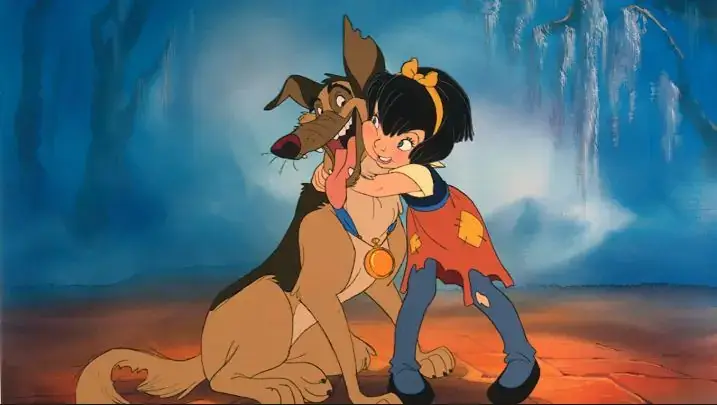ALL DOGS GO TO HEAVEN. Uconventional children’s animation

“Ultimately, all dogs really do have to go to heaven. In Don Bluth’s portrayal, however, it’s a tough journey: full of dead ends, littered with temptations, lacking alternatives, with wolf pits and mines along the way. This is what Charlie, a German Shepherd, goes through. Yet, he is not an innocent and lost hero facing a moral test. He’s far from Disney’s flawless characters, and for most of the film, it’s hard to root for him. Charlie doesn’t mix good deeds with bad ones; his moral backbone seems permanently broken, with no chance of rehabilitation.
Yes, “All Dogs Go to Heaven” is still a children’s animation. It’s not without a ‘message’ or educational ambitions, but it’s unconventional in that, compared to the competition, its lead character wouldn’t be a frightened Simba, but the treacherous Scar; not the tender and sensitive Mulan, but the ruthless Shan Yu. This makes for a surprising twist in Don Bluth’s animation, showcasing its originality and bravery in tackling the subject. The ‘what’ remains the same, but the ‘how’ makes all the difference.
The film opens with a prison escape scene. Charlie, along with his friend, a dachshund named Itchy, digs a tunnel and escapes into the rainy night. Rehabilitation has proven ineffective. Charlie doesn’t hesitate for a moment. He returns to the city, to his old friend, the bulldog Carface, with whom he ran a profitable gambling club. He plans to take control again, revel in a sea of alcohol and dollars, plot and cheat. After all, that’s what he’s best at.

However, Carface has no intention of splitting the profits anymore and orders Charlie’s murder. Especially since Carface is holding a real goldmine—Anne-Marie, a little girl who can understand animals and is therefore very helpful in betting on rat races. Our hero doesn’t even realize what’s happening. Not even 15 minutes into the movie, and he ends up at the gates of heaven. The vision of idleness and lazy lounging on clouds is, of course, not too appealing to Charlie. So, he steals his Life Clock and returns to Earth—resurrected. But not to redeem himself or right his wrongs, but to take revenge and settle the score. He discovers that the best way to hurt Carface is by taking Anne-Marie, who dreams of a warm, loving home.
Charlie’s relationship with the girl becomes the film’s central dramatic focus. The German Shepherd is a very stubborn student. He wants the same from Anne-Marie as Carface did: for her to stay quiet, completely submit to him, and make money for him. Moreover, he doesn’t know how to respond to her gratitude, affection, and interest. Anne-Marie expects him to act against his own instincts at times: to take care of the poor, and above all, to help her find her parents. The creators manage to create an interesting dynamic between them. It evolves slowly, with many obstacles, often stalling, and doesn’t promise a happy ending.

“All Dogs Go to Heaven” is not only well-written in terms of character development. Equally captivating is the rich world it presents, historically grounded in a specific setting (New Orleans, 1939), but really a place designed by the creators’ imagination: exaggerated and using caricature. Most of the locations are dumps and car junkyards. A break between them comes in the form of Charlie’s nightmare vision of hell, a fairytale sequence with a giant crocodile, or scenes among the clouds of an idyllic heaven. It’s more fantasy than a true story. Each of these places is filled to the brim with details and background characters. For Don Bluth, the setting is just as important as the protagonist. These same principles were evident in the excellent “The Secret of NIMH”.
In “All Dogs…”, the only real drawback might be the musical scenes. They feel forced and out of place in Bluth’s animation, which leans more towards a gangster story. It almost seems as if the songs were added after production was completed, just to soften the film and add more warmth and humor. Another issue is the ideological message of the animation. At its core, it draws on Christian values and faith, offering a perspective on human life (or, more precisely, that of a personified dog). This can lead to an interesting discussion. Whether or not Charlie deserved eternal reward or should have faced some consequences for his wrongdoings is a matter of debate.”

